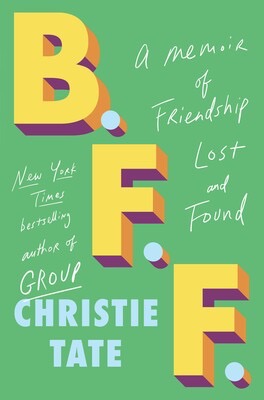The Ethics of Memoir Writing
For Chicago-based writer Christie Tate, writing about the ebb and flow of human connection comes naturally. Author of the 2020 New York Times bestseller and Reese’s Book Club memoir Group: How One Therapist and a Circle of Strangers Saved My Life, Tate has released another book this year detailing her intimacies and complexities of female friendship. In an interview for Chicago Magazine, Kim Brooks – another Chicago based writer and author of Small Animals: Parenthood in the Age of Fear – talks with Tate about her new memoir, B.F.F.: A Memoir of Friendship Lost and Found. Tate tells Brooks this memoir is “a story about getting well around friendship” and how women can come together to heal.

Image courtesy of Simon & Schuster
I admire Tate’s willingness to be open and honest with one of the most complex phenomena I have ever experienced in all my years of girlhood: friendship. I applaud the way Tate holds space for women and keeps them as her main focus, telling Brooks that this is a book “for and about women.” With Tate being a Chicago native -- she grew up and still lives in Hyde Park -- I am excited to see the ways that Chicago is woven into the details of this books, especially when it comes to the details of growing up as a girl in Chicago.
One thing I found particularly interesting about this book – and memoirs in general – is the legal and emotional implications of them. The Chicago Tribune has an article which describes this in respect to Tate’s debut novel Group, writing about the effects that memoirs – which usually include large amounts of intimate details about those close to the author – can have on those who are included in the story. Is it ethical to write a memoir detailing the connections you have with someone who is still alive? Are we betraying others in our lives by including the intimate details of their day to day? How much of what happens to us is just ours to tell when our lives are so closely interwoven with the lives of those around us? These are questions that Tate and Brooks do not have all the answers to, as the answers may vary by writer, book, and even reader. Exploring these questions that memoir authors face, however, is a sign of our humanity and willingness to confront the human experience without wounding others. ✧
Something you loved about this piece? Questions, comments, concerns? Let me know!

Post a comment